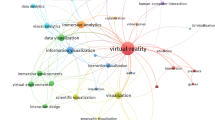Abstract
As interest in video games increases, so does the need for intelligent access to them. However, traditional organizational systems and standards fall short. To fill this gap, we are collaborating with the Seattle Interactive Media Museum to develop a formal metadata schema for video games. In the paper, we describe how the schema was established from a user-centered design approach and introduce the core elements from our schema. We also discuss the challenges we encountered as we were conducting a domain analysis and cataloging real-world examples of video games. Inconsistent, vague, and subjective sources of information for title, genre, release date, feature, region, language, developer and publisher information confirm the importance of developing a standardized description model for video games.
Similar content being viewed by others
Abbreviations
- SIMM:
-
Seattle Interactive Media Museum
- FRBR:
-
Functional requirements for bibliographic records
- OCLC:
-
Online computer library center
References
Anderson, D., Delve, J., Pinchbeck, D.: Toward a workable emulation-based preservation strategy: rationale and technical metadata. New Rev Inf Netw 15(2), 110–131 (2010)
Baca, M.: Visual Resources Association Cataloging Cultural Objects: A Guide to Describing Cultural Works and Their Images. American Library Association, Chicago (2006)
Bagnall, P., Dewsbury, G., Sommerville, I.: The limits of Personas. In: Proceedings of the 5th Annual DIRC Research Conference, pp. 39–40 (2005)
Canadian Library Association: Chartered Institute of Library and Information Professionals (Great Britain), Joint Steering Committee for Development of RDA, American Library Association: RDA toolkit: resource description & access. American Library Association, Chicago (2010)
Chapman, C.N., Milham, R.: The personas’ new clothes: methodological and practical arguments against a popular method. In: Proceedings of Human Factors and Ergonomics Society Annual Meeting, pp. 634–636 (2006)
Cook, T.: The concept of the archival fonds in the post-custodial era: theory, problems and solutions. Archivaria 35, 24–37 (1993)
Cooper, A.: The Inmates are Running the Asylum. Sams, Indianapolis (1999)
Dublin Core: Dublin Core metadata element set, version 1.1. http://www.dublincore.org/documents/dces/. Accessed 20 March 2012 (2003)
Gee, J.P.: What Video Games Have to Teach us About Learning and Literacy. Palgrave Macmillan, New York (2003)
Global Industry Analysts: Video Games–a Global Strategic Business Report. http://www.strategyr.com/Video_Games_Market_Report.asp. Accessed 20 May 2012 (2009)
Grudin, J., Pruitt, J.: Personas, participatory design and product development: an infrastructure for engagement. In: Proceedings of the Participatory Design Conference, pp. 144–161 (2002)
Hagler, R.: Nonbook materials: chapters 7–11. In: Clack, D.H. (ed.) The Making of a Code: The Issues Underlying AACR2. American Library Association, Chicago (1980)
Hanlon, A., Copeland, A.: Using the Dublin Core to document digital art. J. Internet Cat. 4(1–2), 149–161 (2001)
Hjørland, B.: Domain analysis in information science. Eleven approaches–traditional as well as innovative. J. Documentation 58(4), 422–462 (2002)
Huth, K.: Probleme and Lösungsansätze zur archivierung von computer programmen–am beispeil der software des ATARI VCS 2600 und des C64. Unpublished master’s thesis, Humboldt Universitat (2004)
IFLA Study Group on the FRBR: International Federation of Library Associations and Institutions, Section on Cataloging, Standing Committee: Functional requirements for bibliographic records: final report. K.G. Saur, München (1998)
Kruth, M.: An interview with Barbara B. Tillett. Cat. Classif. Q. 32(3), 3–24 (2001)
Lee, J.H.: Analysis of user need and information features in natural language queries seeking music information. J. Am. Soc. Inf. Sci. Technol. 61(5), 1025–1045 (2010)
Leigh, A.: Lucy is “Enceinte”: the power of an action in defining a work. Cat. Classif. Q. 33, 3–4 (2002)
McDonough, J., Kirschenbaum, M., Reside, D., Fraistat, N., Jerz, D.: Twisty little passages almost all alike: applying the FRBR model to a classic computer game. Digit. Humanit. Q. 4(2) (2010)
McDonough, J., Olendorf, R., Kirschenbaum, M., Kraus, K., Reside, D., Donahue, R., Phelps, A., Egert, C., Lowood, H., Rojo, S.: Preserving Virtual Worlds Final Report. http://hdl.handle.net/2142/17097. Accessed 17 January 2012 (2010)
Millar, L.: The death of the fonds and the resurrection of provenance: archival context in space and time. Archivaria 53, 1–15 (2002)
OCLC: Digital Archive Metadata Elements. Online Computer Library Center, Dublin (2003)
Rinehart, R.: The Media Art Notation System: documenting and preserving digital/media art. Leonardo 40(2), 181–187 (2007)
Spiteri, L.F.: The use of facet analysis in information retrieval thesauri: an examination of selected guidelines for thesaurus construction. Cat. Classif. Q. 25(1), 21–37 (1997)
Svenonius, E.: The intellectual foundation of information organization. MIT Press, Cambridge (2000)
The Entertainment Software Association: Essential facts about the computer and video game industry. http://www.theesa.com/facts/pdfs/ESA_EF_2011.pdf. Accessed 30 March 2012 (2011)
Tillett, B.B.: What is FRBR? A conceptual model for the bibliographic universe. http://www.loc.gov/cds/FRBR.html. Accessed 2 October 2011 (2004)
Winget, M., Murray, C.: State of the archive: a review of video game archives within the United States. In: Proceedings of the Annual Meeting of the American Society for Information Science & Technology. ASIS &T, Columbus (2008)
Winget, M.A.: Videogame preservation and massively multiplayer online role-playing games: a review of the literature. J. Am. Soc. Inf. Sci. Technol. 62(10), 1869–1883 (2011)
Acknowledgments
We would like to thank the class participants of INFX 598 Video Game Metadata and especially Andrew Perti at the SIMM for their valuable contributions to the project.
Author information
Authors and Affiliations
Corresponding author
Appendix
Appendix
1.1 Five personas and use scenarios
1.1.1 Player persona
Name: Jeffrey Cunningham
Occupation: Junior High Student
Gender: Male
Education: As a junior high student, Jeffrey excels in art, wood shop, and typing classes. He plays basketball on the JV team.
Computing and Web experience: Owned his first laptop computer at age 10. Although he’s not into programming, he does have considerable Web 2.0 skills. He regularly updates two separate blogs, participates in fantasy football and baseball leagues, and has 1,432 friends on Facebook. Plays lots of online video games.
Personal Web behavior patterns: Likes to browse game web sites. Has special affinity for gamefaqs.com and gamerankings.com. Uses these sites mostly to inform video game purchases and obtain gameplay information.
How they will use the site: Jeffrey comes to thesimm.org mostly as a recreational activity. He enjoys the ability to view hi-resolution box art for his favorite games. He also browses the tiff files of classic game magazines. Recently he has taken an interest in researching the histories of local gaming companies he might one day apply to.
Any additional site-specific demographics: Jeffrey can’t wait to get an iPad to peruse game magazines on the go.
1.1.2 Parent persona
Name: Marcia Strom
Occupation: Classroom Assistant
Gender: Female
Education: BA in Psychology
Computing and Web experience: Primarily uses a desktop at home for email. Will browse the web to shop on occasion and is a whiz at using travel sites to find good airplane fares.
Personal Web behavior patterns: Marcia does not use a large variety of websites. Once she is comfortable with a certain interface it takes a lot to pull her away to another one. She found out about thesimm.org through her son who went on a field trip to the SIMM.
How they will use the site: Once Marcia’s son Joey showed her thesimm.org, she immediately saw a link connecting the exhibit Joey saw on video game music design to Super Mario Brothers 3, a game she played while in college. Once the floodgates to Nostalgia Land opened, Marcia spends free time watching gameplay videos and listening to music files of the games she played with her dad as a young girl.
Any additional site-specific demographics: Marcia has three children and plans on taking them to the SIMM to see the exhibits in person.
1.1.3 Nostalgia/collector persona
Name: Sam Schneider
Occupation: Copywriter for Amazon.com
Gender: Male
Education: BA in Communications
Computing and Web experience: Very web savvy, especially Web 2.0. Has designer friends and colleagues and he definitely “speaks the language”.
Personal Web behavior patterns: Uses a tablet for most of his non-writing computing needs. Keeps tabs on his world with heavy use of RSS feeds. Facebook lurker.
How they will use the site: Sam is a true game geek and spends a fair amount of time browsing numerous game sites. He has recently adopted thesimm.org as his go-to site for information on classic video games. He surfs here because the associative interface keeps attracting his attention to items he has not seen in years. These include gameplay videos, screenshots, and hi-resolution promotional art he loved when he was younger.
Any additional site-specific demographics: Gamer with wife and kids, but lots of expendable income. He has a man den that includes current generation systems and a few classic ones too.
1.1.4 Academic/scholar persona
Name: Dr. Clancy P. Russell
Occupation: Economics professor
Gender: Male
Education: PhD in Social Economics
Computing and Web experience: Is seasoned when it comes to internet research in library databases. Has good luck with Google. Does not create much on the web; he mostly has his teaching assistants create his web content.
Personal Web behavior patterns: Dr. Russell is very old-school when it comes to using the internet. He is skilled at searching library databases but needs assistance from library staff to hone in on and find some articles. He keeps two email accounts: one on Yahoo! and the other at the university. The only web news he pursues is on the Yahoo! front page.
How they will use the site: Dr. Russell is teaching a class in social economics. One of his modules will focus on the phenomenon of microtransactions on the Xbox Live Marketplace and the Playstation Network. He uses thesimm.org to find links to the most current research and scholarship regarding both the games chosen for the study, and microtransactions in general. He uses the creator information to contact the producers of the games in hopes of setting up a webinar for his students.
Any additional site-specific demographics: Dr. Russell does not do a lot of research on video games outside of library databases, so he chose thesimm.org because he is confident that the information is both accurate and presented clearly.
1.1.5 Game developer/designer persona
Name: Debra Gurvitz
Occupation: Game Designer
Gender: Female
Education: BS Computer Science
Computing and Web experience: Expert
Personal Web behavior patterns: Surfer, Publisher, and Critic
How they will use the site: Debra is constantly looking for new ideas for games based on themes, mood, and characters of older games. She is also always interested in trivia related to games so she can try to design with that in mind.
Any additional site-specific demographics: Debra knows the thesimm.org is a robust database where she can find arcane bits and pieces to put into her designs. She also knows that she can look at a wide range of games displayed by different criteria. This allows her to make accurate references to past games in the new ones she creates.
1.1.6 Curator/librarian persona
Name: Nancy Henderson
Occupation: Academic Librarian
Gender: Female
Education: MS LIS
Computing and Web experience: Nancy is quite tech-savvy and always up-to-date on new IT devices and applications.
Personal Web behavior patterns: As a librarian, she is extremely skilled at searching library databases and the Web for any type of information. She also spends a lot of time on the Web, and especially on social media websites.
How they will use the site: At Nancy’s library, they have decided to build a video game collection for students as well as scholars who are interested in game research. She uses thesimm.org to learn more about how games are organized, and get inspired on how she can organize the games in their new collection as well.
Any additional site-specific demographics: She is not a gamer herself, so she has to look up information on video games on various website to help plan the game-related library events and programs.
1.2 Games used for testing
Table 3. Games used for testing the metadata schema
Rights and permissions
About this article
Cite this article
Lee, J.H., Tennis, J.T., Clarke, R.I. et al. Developing a video game metadata schema for the Seattle Interactive Media Museum. Int J Digit Libr 13, 105–117 (2013). https://doi.org/10.1007/s00799-013-0103-x
Received:
Revised:
Accepted:
Published:
Issue Date:
DOI: https://doi.org/10.1007/s00799-013-0103-x




